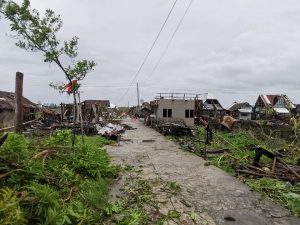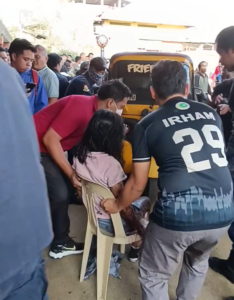Organized self-help group (SHG) in Calle San Vicente did not only devote their functional roles in survivor and community-led response (sclr) to support their members to access humanitarian services. They initiated mental health support too, to the most depressed amongst them.
The self-help group – composed of 20 families, were recipients of P44,000 micro-cash grant utilized for food and non-food items – also demonstrated care for a member who suffered mental illness as a complex consequence of severe depression and poverty after losing her house to the destructive flooding brought by Shear Line while she was emotionally beset by being abandoned by her husband with two children and an infant to survive.
“We need to help each other so that we will not feel alone and isolated. That was most important for us. That made the self-help group truly purposeful is helping the most vulnerable and dispossessed among our members,” said Erlinda Rivera, a resident of Calle San Vicente, Ayala, Zamboanga City, one of the coastal areas of the city that was severely inundated due to Shear Line which brought continued heavy rain and destructive flooding.
“Many of us lost our houses and personal belongings. We lost our sources of income; others lost their jobs. That disaster happened too at the time when the fish plant had to downsize its employees,” Rivera related.

Erlinda Rivera, (holding a yellow metacard) one of the community leaders of the self-help group in Calle San Vicente, barangay Ayala, Zamboanga City (VMG) during the Learning Review held on April 14, 2023 in Ayala Gym. Besides her is Kim (right and in face mask) and her neighbors in San Vicente who uphold the inclusion of mental health care for the most depressed member of the SHG.
“One of us is a single mom with three kids and whose house was partially damaged but, in our assessment, is already impossible to continually stay there. Having lost her property added more to the severity of her poverty and confusion on how to deal with her children, one of which is a 6-month-old infant. The distress and depression affected her mind. We saw her carried her child under the rain and threw it in a grassy part in a shoreline,” Rivera related.
Rivera was referring to a 33-year-old Kimly Dizon. The latter appeared to have suffered post- partum depression after her husband abandoned them. She was whirling around the emotional and economic distress of this abandonment when flooding brought by Shear Line inundated and devastated her home. While they were able to secure her children from the disaster, it left them nothing to return to. Circumstance forced them to settle with her old mother who can barely support them except offer a space to temporarily settle. This meant also living with the rest of the siblings in a small space.

Kimly Dizon, 33 years old (in red-white FILA shirt), with another SHG member–, also a mother of ten children, who had been assisting Kim to seek financial support from local officials to address her mental health care and basic needs (VMG).
Kim related that she got sick. “Wala ako sa normal na pag-iisip noong itinapon ko ang aking anak. Hindi ko nga maalala na tinapon ko pala ang aking anak. Hindi kasi ako makatulog sa kakaisip paano ko buhayin ang mga anak ko. Takot ako sa mga tao. Sasaktan nila ako. Sabi nila tumatakbo ako tuwing gabi doon sa kakahuyan. Gusto ko ring mag suicide. (I’m out of my mind when I threw my child away. I cannot even recall that I have thrown away my child. I cannot sleep thinking about how will I be able to feed my children. I’m afraid of the people. They will harm me. I also have wanted to die.)
Rivera said that Kim’s family will tie her sometimes to prevent her from harming her children.
The SHG members have provided Kim several advises as morale support to prevent her from taking her life and her children’s. “We have even asked the iFM station to assist her too, which the company likewise, provided basic needs for her and her children, including medication. She was brought in the local mental health facility which provided her antidepressant and medicines that could help her sleep,” other members said.
“They said that the traumatic experiences and stress could result to social isolation, domestic violence, breakdown in relationship, financial problems, and dehumanizing poverty which can increase the risk of mental illness. We wanted to prevent that from happening,” Rivera said.
SHG members thought that had there been deliberate assistance from the government for all, hunger could not spirit away their normal lives. SHG members shared Kim’s personal struggle and seriously noting the poor health of her children too.
True, there were government services but Kim’s family was excluded in the list of recipients. Hence, unable to receive support services. She submitted her records to government agencies, but when financial assistance was released, she’s not among those who benefited.
The SHG themselves had to lobby on her behalf to the local barangay officials to articulate her needs. Albeit the meager amount of assistance that she received recently, at least there is something which she can use to buy rice and milk for her children.

Kim expressed her disturbing behavior is often triggered by eating disorder, hopelessness of the situation, post-natal depression, worries and anxieties, and sadness of her condition.
“I would have wanted to seek employment to feed my children but many of those whom I have approached refused to accept me until I will be able to prove that I am mentally okay,” Dizon lamented.
Dizon understood that the drastic changes of her thoughts and behavior may mean she will have difficulty coping with and may have trouble functioning at work or in normal activities due to mental health problems.
“We really have to include her not only to represent her family but also to feel that she belongs and she deserves to be assisted,” Rivera said.
Vulnerability-based targeting is a complex multi-stakeholder process which may vary in context. This is not solely in the interest of gender-balanced representation from the host and displaced population but grounding in the deepest level where humanitarian workers are able to profile the most vulnerable households experiencing the highest levels of food insecurity and highlight various ways of narrating depression.
“We felt that the self-help group will not only be effective in determining our needs with transparency and enjoying the benefits equitably. Walang lamangan. (No taking advantage of the services). It’s not only that we are able to unify our plans and that we’re cooperating for our special interests. Mahalaga na natulungan namin ang walang-wala. (More important for us is that we are able to help those who have nothing.),” Rivera said.
Disaster resiliency must integrate community-based mental health care to prevent human rights violations and deliver better recovery outcomes for people with traumatic experiences and mental health conditions. For the SHG, strengthening mental health is relevant not only to protect and promote mental well-being but to actually provide psychosocial rehabilitation, peer support services, and services for child protection.
In all traumatic experiences, there is a vast gap for common mental health condition such as depression and anxiety which the humanitarian community should innovate to deliver and to scale up for non-specialist psychological counseling.
Mental health experts had been asserting that humanitarian works should uphold to strengthen mental health care to address the full spectrum of mental health and affordable quality community-based network of services and supports.
“We had to find ways to support Kim otherwise, the community will be forced to bring her children to the social welfare for custody and for them to survive,” said one of the members of the SHG who had been accompanying Kim in her situation.


